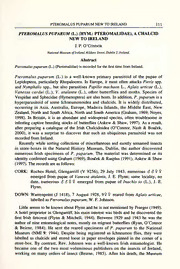
Pteromalus puparum (L.) (Hym.: Pteromalidae), a chalcid new to Ireland PDF
Preview Pteromalus puparum (L.) (Hym.: Pteromalidae), a chalcid new to Ireland
PTEROMALUSPUPARUMNEWTOIRELAND 111 PTEROMALUSPUPARUM(L.) (HYM.: PTEROMALIDAE), ACHALCID NEWTOIRELAND J. P. O'Connor NationalMuseumofIreland,KildareStreet,Dublin2,Ireland. Abstract Pteromaluspuparum(L.)(Pteromalidae)isrecordedforthefirsttimefromIreland. Pteromalus puparum (L.) is a well-known primary parasitoid of the pupae of Lepidoptera, particularly Rhopalocera. In Europe, it most often attacks Pieris spp. and Nymphalis spp., but also parasitises Papilio machaon L., Aglais urticae (L.), Vanessa cardui (L.), V. atalanta (L.), other butterflies and moths. Species of Vespidae and Sphecidae (Hymenoptera) are also hosts. In addition, P. puparum is a hyperparasitoid of some Ichneumonoidea and chalcids. It is widely distributed, occurring in Asia, Australia, Europe, Madeira Islands, the Middle East, New Zealand, North and South Africa, North and South America (Graham, 1969; Noyes, 1998). In Britain, it is an abundant and widespread species, often troublesome in infesting captive breeding stocks ofbutterflies (Askew & Shaw, 1997). As a result, after preparing a catalogue of the Irish Chalcidoidea (O'Connor, Nash & Boucek, 2000), it was a surprise to discover that such an ubiquitous parasitoid was not recordedfromIreland. Recently while sorting collections ofmiscellaneous and mostly unnamed insects in store-boxes in the Natural History Museum, Dublin, the author discovered numerous Irish specimens of P. puparum. The material was determined or its identity confirmedusing Graham (1969), Boucek & Rasplus (1991), Askew & Shaw (1997).Therecordsareasfollows: CORK: Roches Hotel, Glengarriff (V 9256), 29 July 1943, numerous 6 6 99 emerged from pupae of Vanessa atalanta, J. E. Flynn; same locality, no date, numerous 6 8 9 9 emerged from pupae of Inachis io (L.), J. E. Flynn. DOWN: Warrenpoint (J 1418), 7 August 1928, 99 9 reared from Aglais urticae, labelledasPteromaluspuparum, W. F. Johnson. Little seems tobeknown aboutFlynn andhe is notmentioned by Praeger(1949). A hotel proprietor in Glengarriff, his main interest was birds and he discovered the first Irish firecrest (Flynn & Mitchell, 1944). Between 1929 and 1943 he was the author ofnine entomological notes, mostly on migrant butterflies (Ryan, O'Connor & Beirne, 1984). He sent the reared specimens of P. puparum to the National Museum (NMI 9: 1944). Despite being registered as Ichneumon flies, they were labelled as chalcids and stored loose in paper envelopes pinned in the corner of a store-box. By contrast, Rev. Johnson was a well-known Irish entomologist. He became one of the two most voluminous publishers on the insects of Ireland, working on many orders of insect (Beirne, 1985). After his death, the Museum 112 ENTOMOLOGISTSRECORD,VOL. 114 25.V.2002 purchased his hymenopteran collection in 1934. Subsequently, his specimens ofP. puparum musthavebeentransferredfrom thatcollection intotheboxofmiscellanea wherethey werefound. References Askew,R.R.&Shaw,M.R. 1997.Pteromalusapum(Retzius)andotherpteromalid(Hym.)primary parasitoidsofbutterflypupaeinwesternEurope,withakey.Entomologist'smon.Mag.133:67-72. Beirne,B.P. 1985.Irishentomology:thefirsthundredyears.Ir.Nat.J.Spec.Ent.Suppl. Boucek, Z. & Rasplus, J.-Y. 1991. Illustrated key to west-Palearctic genera ofPteromalidae (Hymenoptera:Chalcidoidea).INRA,Paris. Flynn,J.E.&Mitchell,G.F. 1944.FirecrestinIreland.Ir.Nat.J.8: 178. Graham, M. W. R. de V. 1969. The Pteromalidae of north-western Europe (Hymenoptera: Chalcidoidea).Bull.Br.Mus.nat.Hist.,Ent.,suppl. 16: 1-908. Noyes, J. S. 1998. Catalogue ofthe Chalcidoidea ofthe world. CD-ROM. ETI/The Natural HistoryMuseum,Amsterdam/London. O'Connor, J. P., Nash, R. & Boucek, Z. 2000. A catalogue of the Irish Chalcidoidea (Hymenoptera).Occ.Publ.Ir.biogeog.Soc.No.6. 135pp. Praeger,R.L. 1949.SomeIrishnaturalists.Abiographicalnote-book.DundalganPress,Dundalk. Ryan,J. G., O'Connor, J. P. & Beirne, B. P. 1984.A bibliographyofIrish entomology. TheFly LeafPress,Dublin. Anaccidental introductionofamicrolepidopteran toBerkshire? Forsometimenow Ihavebeenengaged inrearing species ofbagwormmoths (Lep.: Psychidae). One such species, Dahlica triquetrella (Hb.), was reared during 1997 and 1998 from material originating from Orpington, Kent (Br. J. ent. nat. Hist 12: 29-30), adults ofthe Fi generation emerging during February and March 1998. The known distribution of this insect in Great Britain is very restricted, being found in West Kent (VC 16), Westmoreland and North Lancashire (VC 69) and recently in South Essex (VC 18). Hence I was very surprised, and somewhat sceptical, to find cased larvae ofthis species ascending three short lengths ofbrick wall atthe farend ofmy road here in Reading during the late summer of2001. Positive identification ofthe speciesinvolvedwasachievedby analysingtheDNAfromonelarva. On 8 September, at 19.30 hours, I noticed the first of these larvae. Three further examples were found the following evening at 16.30 hours, and individual larvae on 10Septemberat 18.00hours, 11 Septemberat 18.30hoursand 12 Septemberat 18.30 hours. Despite nightly checks being made, there then followed a break of around a week, which coincided with cool wet weather, until 20 September, when a further example was found on the same stretch ofwall at 18.00 hours. The weather by this time was much warmer and drier, as it had been on previous occasions when larvae were found. The following night a further larva was found at 17.30 hours, followed bytwomoreon24 Septemberat21.00hours. Theweatherturnedcoldandwetagain, and it was not until it warmed up that more were found. One larva was found on 6 Octoberat 17.00hours, one on9 Octoberat 17.30hours, one on 19 Octoberat 19.00 hours, one on 22 October at 18.00 hours and the final one on 31 October at 21.00 hours. Intotal, 17larvaewerefoundoveraperiodofapproximatelyonemonth.
